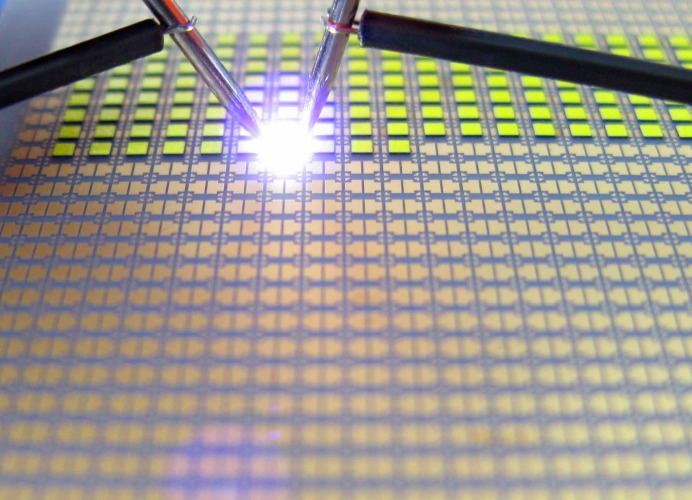A fully optimized production concept for LED components and light modules in which all the process steps are coordinated with one another could give rise to completely new types of LED and also reduce their manufacturing costs. The declared objective of the “InteGreat” project is therefore to research new approaches to the production of high-efficiency light emitting diodes along the entire production process, to remove the boundaries between the individual value-added stages and as a result to create new functionality and high flexibility. Osram Opto Semiconductors as the coordinator together with five partners from industry and research are combining their specific know-how in this project which is due to run until November 30, 2017. “InteGreat” is being supported by the German Ministry for Education and Research as part of the “Photonic Process Chains” initiative.
 |
|
“InteGreat” will optimize the individual processes in LED production in order to develop new processes and thereby reduce manufacturing costs. (Osram/LEDinside) |
A holistic view of the manufacturing process – from epitaxy (crystal growth) to the light source itself – should enable synergies to be exploited for maximum effect and new approaches and procedures to be developed. “For the duration of the project we will be researching completely new concepts for LED production and allow ourselves to question the traditional paradigms of the manufacturing process”, explained Dr. Jürgen Moosburger, Project Coordinator at Osram Opto Semiconductors. Established technologies and processes from the classic microelectronics industry will be used and adapted to the specific requirements of LED production. Steps that up to now have been isolated will be networked, which will allow cost-intensive sorting and testing processes to be replaced by comprehensive routines. This could enable production of modern high-power LEDs to be a unified process for the first time. “With the new production concepts we want to be in a position to develop both low-cost miniaturized LEDs and highly integrated modules”, added Moosburger.
Know-how from six partners in different disciplines
To achieve the objective of this project, Osram Opto Semiconductors as the coordinator and the five other partners, namely Osram GmbH, Fraunhofer-Gesellschaft, LayTec AG, Würth Elektronik GmbH & Co. KG and Mühlbauer GmbH & Co. KG, are working closely together. Osram Opto Semiconductors is bringing its years of experience and know-how in LED technologies to the table, and is responsible for the integration and evaluation of the new processes. Osram GmbH as a specialist in lighting solutions will integrate the newly developed LED components in low-cost luminaires and is also supporting the project with its expertise in process technologies. Mühlbauer, a global technology partner for the Smart Card, ePässe, RFID and Solar Backend sectors, is contributing its know-how in engineering to the high-precision processing of electrical components on flexible and fixed substrates including the development of new processes. Würth Elektronik is making its extensive experience in individual solutions for pc board production available. Specifically, it will be researching the ways in which the LED chip can be connected to the pc board. The Berlin based instrumentation expert LayTec is analyzing innovative process control systems for LED manufacture.
The Fraunhofer Institute for Reliability and Microintegration IZM and the Fraunhofer Institute for Integrated Systems and Device Technology IISB are researching the basic technological principles of process control and mounting technology. IZM will contribute its experience in connection technology, and IISB will work on the intelligent control of production processes.
A project as part of photonics research in Germany
The “Integrated High-Volume Production along the LED Value-Added Chain for Large Wafers and Panels (InteGreat)” project started on December 1, 2014 and will be supported by the German Ministry for Education and Research as part of the “Photonic Process Chains” initiative until its planned finishing date of November 30, 2017.





 CN
TW
EN
CN
TW
EN






